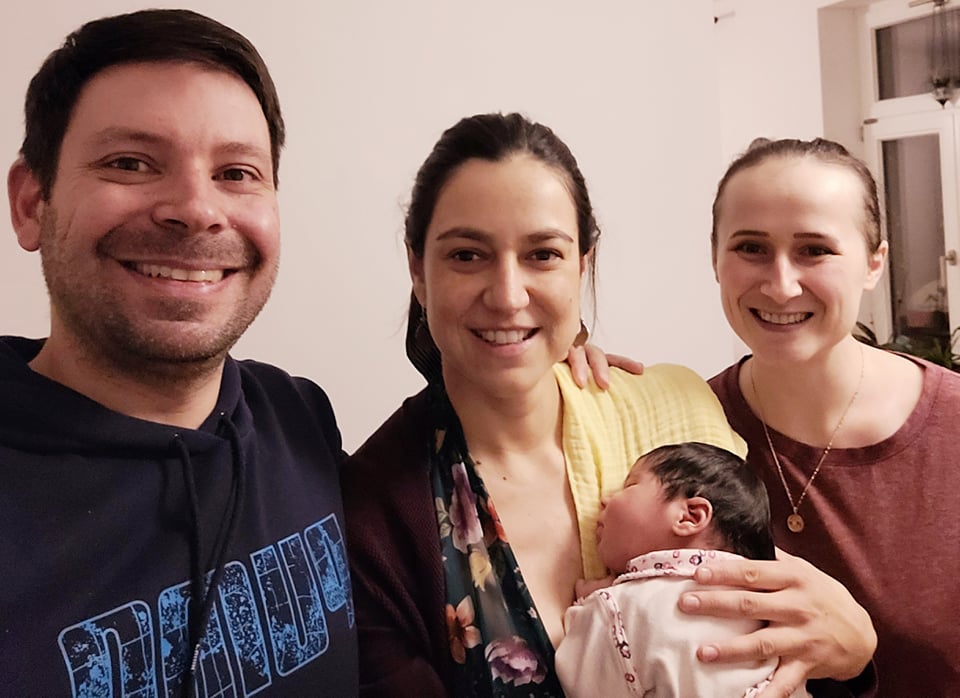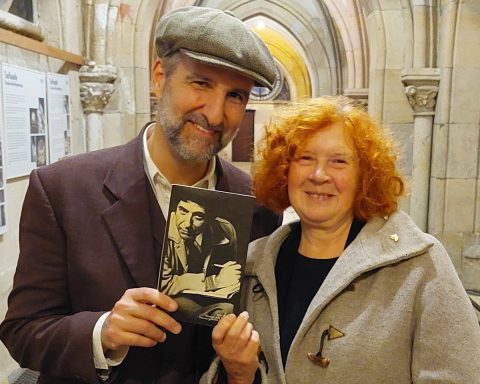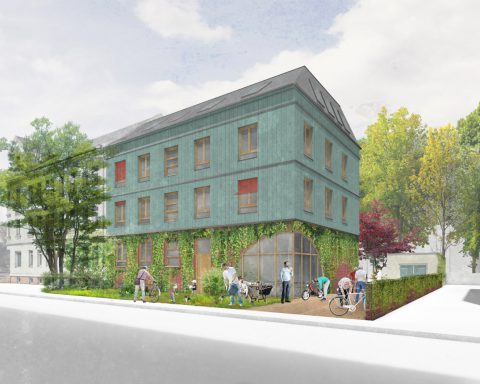I published my first article about giving birth in Leipzig on Leipglo a few months ago. I soon received a comment from Raluca Winn, a doula from Leipzig, who mostly works with foreign women. A doula is a kind of birth attendant. She is a professional trained to accompany births on an emotional and physical level but she is not a midwife, since she has no medical training. She can present the mother to be with options and help her understand the medical terms and process.
Curious, and wondering what more Raluca had to say, I suggested that we meet. And so we did, on a rainy day this summer in Leipzig, surrounded by our two lovely babies who were getting to know each other right next to us.
We talked a lot about the different possibilities of giving birth here. During the conversation, I understood that her role as a doula is to offer informational, emotional, and physical support in pregnancy and during the birth (massage, pain management options, breathing techniques) but also to help women about to give birth to understand what it was going to be like. And to allow them to be masters of their birth as much as possible. To avoid having to say afterward, “I wish I knew”. In short, to give them the keys of understanding and empowerment, so each one can live through this moment with the greatest possible reassurance.

As Raluca told me, childbirth is “a rite of passage that will never be forgotten”. It is an experience that will have repercussions, that will grow in the days, months, and years that follow. Suffering in labor is not normal and it occurs when women are mistreated, ignored, uniformed, or don’t feel safe or accepted. On the opposite, pain is a normal part of labor, and embracing it will actually help to manage the pain. The essence of Raluca’s work is to empower women so that they can freely express their wishes for the birth.
Raluca’s years of accompanying women through birth have shown her that the biggest challenges women face are a lack of language and the fear of asking too many questions. I must admit that I was in the same situation, not daring to ask my midwife for more information. And that only for fear of annoying her, of being ridiculous. I often gave up, saying to myself I would appear silly if I didn’t understand.
To get back to the heart of the matter, here is the information I was able to gather, and that I would like to share with you:
First of all, there are many possible forms of childbirth in Leipzig. So the first step is to have good access to all necessary information. Where, with whom, how – these are the three questions you have to ask yourself when your belly starts to round out and the birth has to be organised, especially when you’re abroad.
The key to the birth here, from the pink bar to the postpartum phase, is the midwife.
Pregnancies can be attended by a midwife and a gynecologist, or by one or the other only. But the one who can really take time for the pregnant woman, before, during, and after, is the midwife, not the gynecologist.
You should choose a midwife around the 3rd or 4th month of pregnancy.
However, don’t panic, you don’t have to sign a contract at the first meeting. The most important thing is to see if you feel comfortable with the midwife in the months to come, in times of doubt and great fragility. You can meet a second midwife if needed, compare, and then take your time before signing a contract. You will have to see this midwife at least once a month before the birth and then every day during the first few weeks with the baby, so you have to choose someone you trust and that you will want to see even without having showered after a very short night!
There are three types of midwives: first, there are those who are hired by the hospital and whom you meet on the day of the birth. Then, those who do the pre- and post-natal care, but do not go to the hospital. And if you want to be accompanied by the same midwife from the beginning to the end, you have to choose a Geburtshaus.
But how do you choose where to give birth? Most women choose the hospital or the Geburtshaus, but home births are also permitted.
If you decide to go to a Geburtshaus, you should register early, even in the first trimester. A Geburtshaus offers preparation courses, courses in perineal rehabilitation, and, above all, very personal support. Only one midwife provides the follow-up, but the pregnant woman meets two or three of them in order to know which one will be present on the D-Day according to the date of the birth. The big difference lies in this personalised follow-up and the fact that it is not medicalised.

No medical procedures are performed in a Geburtshaus. If complications occur, the woman is immediately transferred to a hospital. Approximately 15% of women are transferred to hospitals. For obvious reasons, it is impossible to give birth in a Geburtshaus if the pregnancy is complicated! Finally, this birth modality is not free. You have to pay between €700 and €800, of which the Krankenkasse pays about €200. You pay for the fact that the midwives are available 24/7.
There are three hospitals in Leipzig where you can give birth, and they have different advantages and disadvantages.
The Uniklinik is by definition a university hospital, so students are present during deliveries, which happened to me. It also means that you have more staff taking care of you. It is the Uniklinik that receives all complicated pregnancies. But St. Georg and St. Elizabeth also have neo-natal stations. At the Uniklinik, only one person can accompany the mother during the birth, whereas in the other hospitals, several people are allowed. Indeed, you can be accompanied not only by your partner but also by a person of your choice, for example, a doula.
To close this mini-series, I’ll use a comparison made by Raluca, which made me laugh but also think: she compares sex and childbirth.
If it’s your first time, you ask yourself a lot of questions… The whole of humanity has done it before, and yet we don’t really know how it will happen. So, if someone comes by every 10 minutes to check that everything is fine by turning on the neon lights, we might get anxious. On the other hand, a relaxed atmosphere, soft lighting, good music, and the knowledge that you can trust the people around you can help. And above all, don’t forget that in the end, you always succeed!







![Wine & Paint event on 9 Nov. 2024 at Felix Restaurant, Leipzig. Photo: Florian Reime (@reime.visuals] / Wine & Paint Leipzig](https://leipglo.com/wp-content/uploads/2024/12/pixelcut-export-e1733056018933-480x384.jpeg)


